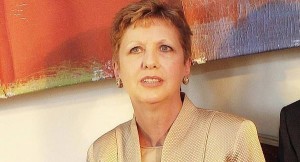
By Sarah Mac Donald - 08 February, 2015
Marie Collins, Irish survivor of clerical sexual abuse and member of the Vatican’s Commission for the Protection of Minors, has criticised Pope Francis’s comments on parental corporal punishment.
Speaking at a news conference in Rome on Saturday, Mrs Collins said she disagreed with the Pope’s remarks which were made at last Wednesday’s general audience to 7,000 pilgrims.
Delivering an address on the responsibilities of fatherhood, the Pope praised a father he had met who admitted to having smacked his child though not on the face.
Marie Collins told RTE News that she did not agree with corporal punishment for a child “under any circumstances”.
Elsewhere she said, “The good thing about the Holy Father is he speaks without thinking, which in many ways I think is good because it is refreshing. Maybe sometimes he sort of puts his foot in it, but he’s an honest man and I respect him for that. It’s not an opinion I would hold.”
Her comments follow those of the former president Dr Mary McAleese in a letter published in Saturday’s Irish Independent.
Separately, Vatican spokesman, Fr Frederico Lombardi has issued a clarifying statement denying the Pope encouraged parents to hit their children.
In his statement, Fr Lombardi said, “The Pope, for his part, was not encouraging parents to hit their children. As has been correctly observed, the Pope always shows great affection and tenderness towards children.”
Elsewhere in his clarifying statement he said, “I wish only to point out that the Pope was speaking about the responsibility of parents to ‘correct without humiliating’, or rather, to assume the responsibility of keeping their children on the right track and to help them to grow up well, but always to do so with love and with respect for their dignity.”
He continued, “Finding the right way to ‘correct without humiliating’ is part of the responsibility of good parents in a variety of situations.”
In her letter, former president Mary McAleese questioned Pope Francis’ comments on smacking children warning it could signal a turning back of the clock in the Church’s attitude to corporal punishment and children’s rights.
In her letter, the former professor of law at Trinity who is currently completing a doctorate in canon law, highlighted that the Vatican is a signatory to the UN Convention on the Rights of the Child.
It advocates the universal abolition of corporal punishment of children in all circumstances.
 The mother of three refers to an exchange between the Holy See last year and the UN Committee on the Rights of the Child which claimed that corporal punishment “remains widespread in some catholic institutions” and said it “reached endemic levels” in countries like Ireland as demonstrated by the Ryan Report.
The mother of three refers to an exchange between the Holy See last year and the UN Committee on the Rights of the Child which claimed that corporal punishment “remains widespread in some catholic institutions” and said it “reached endemic levels” in countries like Ireland as demonstrated by the Ryan Report.
The UN Committee also highlighted that the Vatican does not consider corporal punishment prohibited by the UN Convention and has therefore has not enacted guidelines banning corporal punishment of children in catholic schools and institutions, as well as in the home.
According to Dr McAleese, the Holy See said it would submit a thorough study and examination in respect of the Convention.
She has questioned whether the Pontiff’s advocacy of parental corporal punishment is an indication that the Vatican has conducted this study and is now promoting the corporal punishment of children.
Her letter to the Irish Independent also questions whether the Vatican has decided to “oppose the stated view of the Committee that the corporal punishment of children should be banned”.
She further asks, “Is the Holy See now doing what it claimed not to be doing a year ago, namely actively and internationally promoting the corporal punishment of children?”
“If it is, then Pope Francis has surely turned the clock back considerably,” she warns and comments, “What faith are we to have now in the Holy See’s Commitment to the Convention on the Rights of the Child?”
The former president has clashed with the Church on a number of issues.
Last September in an address in Sydney, the two-term former head of state, argued for an increased role for women in the church, saying: “The old boys’ club are going to have to go.”
She has also being highly critical of the church’s synod on the family saying it was “bonkers” for a celibate male clergy to be making decisions on marriage and the family.
In a conversation following her receipt of UCD’s Ulysses medal on Bloomsday last June with Professor Conor Gearty, Mrs McAleese questioned how many of the people taking part in the synod had ever changed a baby’s nappy.
Dr Mary McAleese was appointed Distinguished Professor in Irish Studies at St Mary’s University in London in December and will take up her role there in 2016. It is the largest catholic university in the UK.
Having completed two terms as President of Ireland from 1997 to 2011, since leaving office she has been preparing a doctorate in canon law at the Gregorian University in Rome and lecturing as a Visiting Professor at Boston College.
The former head of state is also involved in a major new documentary on the life of St Columbanus which is part of the celebrations marking the 1,400th anniversary of the Saint’s death in Bobbio, Italy in 615 which is due to be aired in November on RTE.